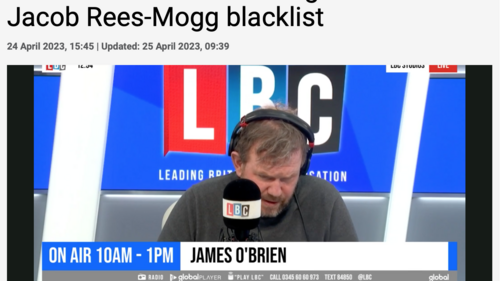Ban the Blocklists

It’s a huge privilege having a regular column in the Times. It means I can put pressure on decision makers and highlight injustices.
That’s what happened this week when I raised the case of a local Westminster resident who has fallen foul of a secret government rule than bans critical voices from taking part in official conferences.
I called this person “Richard Hannay” because I don’t want to make things worse for him. He’s a world expert in an obscure but important field where science, technology, intelligence, international law and military matters overlap.
He also tweets. He’s a Lib Dem and his tweets are often rightly critical of government policy.
But a couple of weeks ago he was “disinvited” from an official conference, with an email that read:
“Rules introduced by the Cabinet Office in 2022 specify that the social media accounts of potential speakers must be vetted . . . to check whether these people have ever criticised government officials or government policy. The vetting process is impartial and purely evidence-based. The check on your social media has identified material that criticises government officials and policy. It is for this reason . . . that I am afraid that we have no choice and must cancel your invitation.”
That got me really cross — I lived in communist-run eastern Europe where people were scared to speak out in public. I don’t want that happening here.
It’s particularly odd given that Conservatives like Jacob Rees-Mogg, who as the minister introduced this secret rule, are always banging on about free speech, woke culture and snowflakes! So why are they so bothered by people who disagree with them giving talks at official conferences?
First I wrote to the Cabinet Office — no reply. So I featured the case in my Monday column (you can read it here).
That got things moving. The same day I was on LBC with James O’Brien talking about the case (you can listen to me here) And on John Pienaar’s show on Times Radio (listen here at 37:42) My friend the Lib Dem MP Christine Jardine has fired off a letter to the Cabinet Office. So too have Lib Dem colleagues in the House of Lords. My friend has submitted a GDPR request to see what data the government holds on him. And I am drafting a Freedom of Information request too.
The BBC’s Newsnight programme has picked up the issue, finding another victim of this ban — details here and watch her speak here. The programme segment is here.
It’s a great example of how we can use a mixture of media pressure, the political system and other legal remedies to tackle government abuse of power.
But we are not done yet!
We want the government:
- to publish, in full, any rules or guidance used by officials when inviting external speakers, including social media checks;
- to provide the remit of these rules, including listing which organisations they apply to,
- to explain who is involved in the process, including which staff lead on the checks and how many are involved in scrutinising these decisions, if any;
- to publicise the number of checks made, and the number of invitations withdrawn, or never issues, because of these checks; and
- to provide details of any cost incurred by the taxpayer for the employment of or overtime payment to staff who oversee carrying out these checks.
Watch this space…
